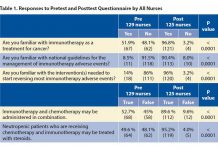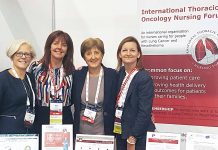Posted: June 2017
By Kimberly Rohan, ANP-BC
Treatment for patients with NSCLC today has become increasingly personalized over the past few years. It is paramount to be able to test a patient’s tumor for mutations and other molecular aberrations to provide the most effective care. In 2004, the observation was made that somatic mutations in the kinase domain of EGFR strongly correlated with the sensitivity to EGFR TKIs.1 This discovery led to a change in practice for those whose tumors had the EGFR mutation. More recently, very specific therapy has emerged for those patients who develop resistance to the TKIs (T790M). Currently, the known mutations and molecular translocations for lung cancer for which there are therapies include EGFR, T790M, ALK, ROS1, BRAF, and MET.
The issue for many is the lack of available tissue to run the various tests and to prioritize the sequencing of testing. Several blood-based tests are now available for those who cannot get enough tissue for testing. The sensitivity of these blood tests, or liquid biopsies, is about 46% with specificity of 97%, positive predictive value 78%, and negative predictive value 90%.2 It is important that the patient understands the risks and benefits of blood testing versus tissue testing, which may require a repeat biopsy.
The role of the Advanced Practice Practitioner (APP) in caring for these patients is to ensure that the testing is completed in a timely manner and that the patient understands the significance and clinical implications of the testing. By ensuring testing is properly completed, patients will receive appropriate treatment based on the molecular biology of their individual tumors, instead of suboptimal care. Research in the field of lung cancer and targeted therapies is moving very rapidly, requiring the APP to stay informed of the newest therapies, testing strategies, and management of the side effects of these new therapies. A multidisciplinary approach is key to ensuring that during biopsy adequate tissue is obtained to perform testing and that the most efficient process is in place with pathology departments to ensure prompt testing. Nurse navigators have become key members of the multidisciplinary team in educating patients, families, and other health care providers on the importance of these additional tests. Often these test results can take several days to return. This, therefore, requires diligence in tracking the results and ensuring the results are available to clinicians. Each team needs to determine who will share the results and how to make certain they will be available for all team members to view.
As the care of lung cancer patients continues to evolve, it is critical that APPs involved in the care of these patients stay informed. APPs are key members of the treatment team throughout the care continuum. Joining IASLC is one way for APPs to keep abreast of the ever-changing therapeutic landscape in the care of patients with lung cancer.
References
1. Lynch, TJ, Bell, DW, Sordella, R, et al. Activating mutations in the epidermal growth factor receptor underlying responsiveness of non-small-cell lung cancer to gefitinib. N Engl J Med. 2004; 350(21): 2129-2139
2. Reck, M, Hagiwara, K, Han, B, et al. ctDNA determination of EGFR mutation status in European and Japanese patients with advanced NSCLC: The ASSESS study. J Thorac Oncol. 2016; 11(10): 1682-1689.











